Memphis rub seasoning is a dry spice blend traditionally used for barbecue, especially for pork ribs in Memphis-style cooking. It's known for its balanced sweet, smoky, and savory flavors, and is a key component in authentic Memphis barbecue.
Table of Contents
- What Exactly Is Memphis Rub Seasoning?
- The Flavor Profile That Defines Southern BBQ
- How to Use Memphis Rub Like a Pitmaster
- Homemade vs Store-Bought: Which One Wins?
- Buying Guide: How to Choose the Best Memphis Rub
- FAQs About Memphis Rub Seasoning
- Final Thoughts
What Exactly Is Memphis Rub Seasoning?
Memphis rub seasoning is a dry spice mix that's traditionally used to coat meats before they're slow-smoked. It's one of the core components of Memphis-style barbecue, which is known for its tangy, smoky, and slightly sweet flavor profile.
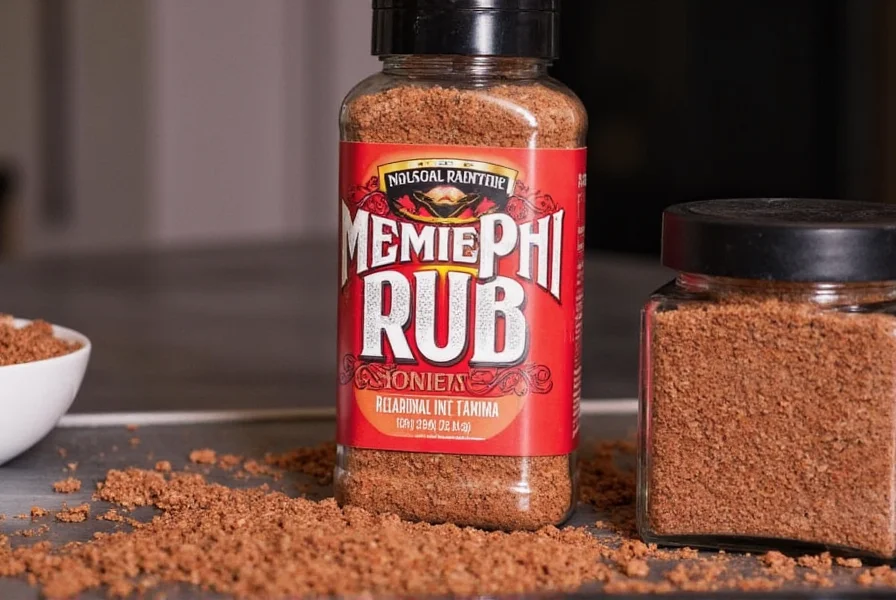
Unlike some other regional rubs (like Texas or Carolina styles), Memphis rub leans heavily on brown sugar and paprika, giving it a sweet base that balances beautifully with heat and saltiness. It typically contains:
- Brown sugar
- Paprika
- Garlic powder
- Onion powder
- Black pepper
- Cayenne (for heat)
- Salt
- Mustard powder (optional)
Historical Roots of Memphis Rub
The city of Memphis has long been a barbecue mecca in the U.S., especially when it comes to ribs. The original concept of dry-rubbing meats was born out of necessity — many pitmasters didn't have access to sauces or couldn't refrigerate them properly back in the day.
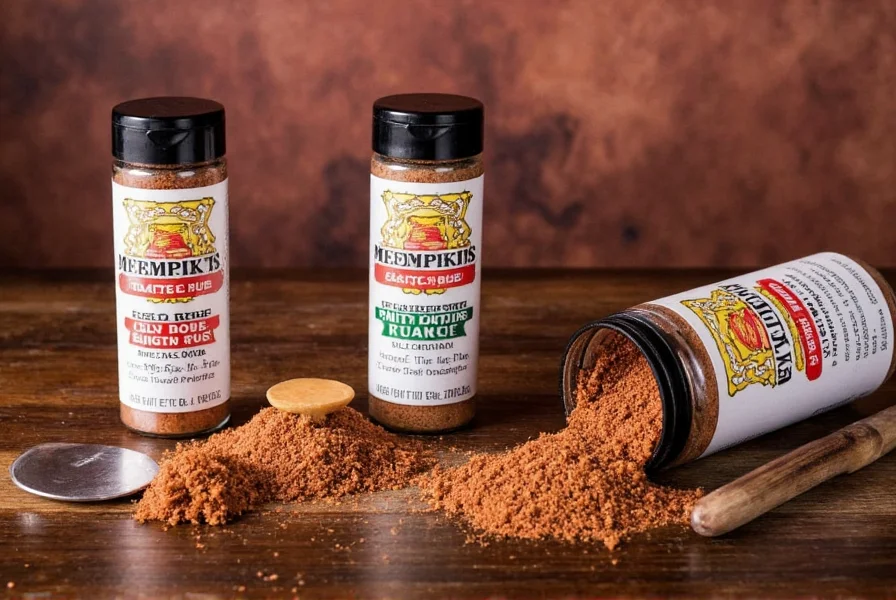
This led to the creation of complex spice blends that could stand on their own without needing a sauce boost. Over time, these blends became signature items for local pits and even formed the basis for competitive barbecue teams today. Historical records show Memphis-style dry rubs emerged in the 1920s-1940s as a practical solution for preserving meat during summer months when refrigeration was limited, evolving from African American pitmaster traditions in the Mississippi Delta region.
The Flavor Profile That Defines Southern BBQ
The beauty of Memphis rub lies in its balance. Here's a breakdown of the key flavor notes you can expect:
| Flavor Note | Description |
|---|---|
| Sweetness | Dominant due to brown sugar; provides a caramelized crust when smoked |
| Smokiness | From paprika and the smoking process; adds depth and richness |
| Heat | Mild to medium from cayenne and black pepper; adjustable based on taste |
| Umami | Thanks to garlic, onion powders, and sometimes mustard powder |
What Makes It Unique?
Compared to Kansas City or St. Louis rubs, Memphis rub is lighter on tomato-based elements and more focused on dry spice application. This allows the meat itself to shine through, especially when using pork, which is the star of Memphis barbecue. For example, Kansas City rub often includes molasses or tomato powder for a sweeter, saucier profile, while Memphis rub relies purely on dry spices for a clean, meat-forward taste.
How to Use Memphis Rub Like a Pitmaster
You don't need a smoker or a competition license to make magic with Memphis rub. Here are some expert-approved tips for getting the most out of this flavorful blend:
1. Apply Generously but Evenly
Use about 1 tablespoon of rub per pound of meat. Massage it into every crevice for maximum coverage and flavor penetration. For ribs, focus on the bone side for better adhesion.
2. Let It Rest
Allow the meat to sit with the rub for at least 30 minutes — or up to overnight in the fridge — so the spices can infuse deeply. This step is critical for flavor development, especially for tougher cuts like pork shoulder.
3. Don't Forget the Veggie Love
Memphis rub isn't just for meat! Try sprinkling it over roasted cauliflower, potatoes, or grilled corn for a smoky twist. For vegetables, use half the amount you'd use for meat to avoid overpowering.
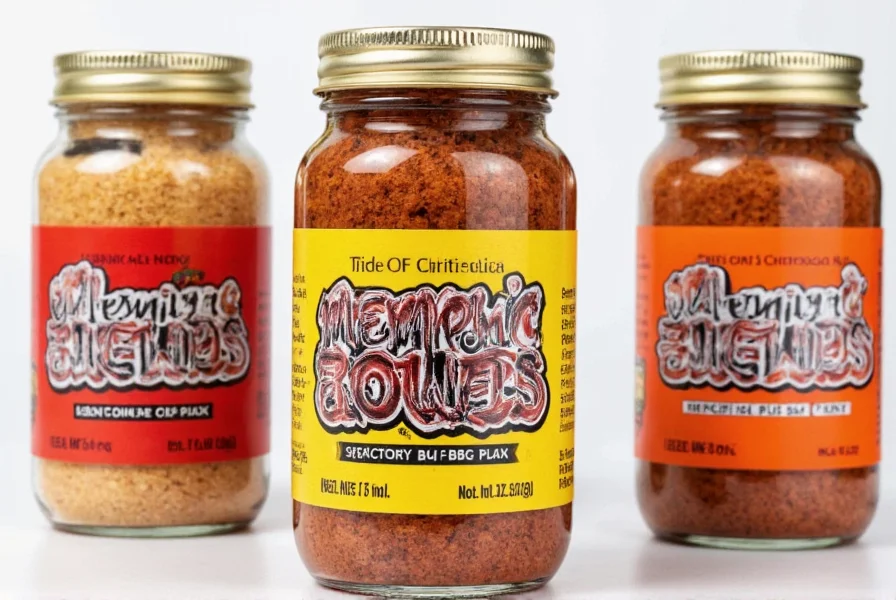
4. Layer with Smoke
While the rub stands on its own, pairing it with wood smoke (hickory or applewood) elevates the flavor dramatically. Avoid mesquite, as it can overpower the delicate balance of Memphis rub.
5. Pair With Sides That Balance the Sweetness
Coleslaw, pickles, or vinegar-based slaw can cut through the sweetness and add contrast to each bite. For a complete Memphis-style meal, serve with baked beans and cornbread.
Homemade vs Store-Bought: Which One Wins?
One of the best things about Memphis rub is how easy it is to customize. You can either buy it off the shelf or whip up your own batch at home.
| Aspect | Homemade | Store-Bought |
|---|---|---|
| Taste Control | You choose the ingredients and intensity | Fixed flavor profile; no adjustments possible |
| Cost | Usually cheaper in the long run | Varying prices depending on brand |
| Convenience | Takes prep time but great for regular users | Grab-and-go ready |
| Freshness | Fresher if stored correctly | May contain preservatives |
Simple Homemade Memphis Rub Recipe
Here's an easy recipe you can try at home:
- ¼ cup brown sugar
- 2 tbsp paprika
- 1 tbsp garlic powder
- 1 tbsp onion powder
- 1 tsp black pepper
- ½ tsp cayenne pepper
- 1 tsp salt
- Optional: 1 tsp mustard powder
Mix everything in a bowl, store in an airtight container, and you're good to go! For keto-friendly versions, substitute brown sugar with erythritol or allulose while maintaining the same ratios.
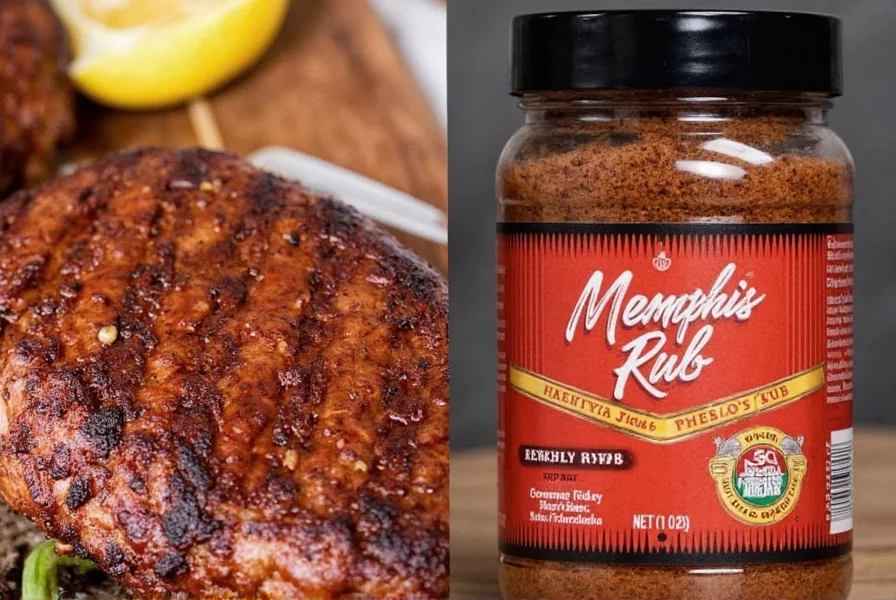
Buying Guide: How to Choose the Best Memphis Rub
Whether you're new to grilling or looking to upgrade your spice rack, choosing the right Memphis rub can make all the difference. Here's how to find the perfect fit for your palate:
1. Know Your Sweetness Level
Memphis rub should be slightly sweet but not cloying. Look for blends that list brown sugar high on the ingredient list but also include savory spices to balance it out. For ribs, aim for a 2:1 sugar-to-spice ratio.
2. Check the Heat Factor
If you like things spicy, opt for a rub that includes cayenne, chili powder, or crushed red pepper flakes. If you prefer milder flavors, avoid blends with too many heat-inducing ingredients. For beginners, choose "mild" or "medium" heat labels.
3. Read the Ingredient List
Avoid artificial additives, preservatives, and unnecessary fillers. The shorter the ingredient list, the better — unless you're buying from a premium brand that uses unique spices for complexity. Always check for gluten-free certifications if needed.
4. Consider the Brand Reputation
Some trusted names in the Memphis rub space include:
- Spice Works Original Memphis Rub: Balanced sweetness and heat; ideal for pork ribs.
- Memphis Q-Dry Rub: Commercial-grade rub used by restaurants and pitmasters.
- Stubb's Memphis Style Dry Rub: Slightly sweeter with a fine texture; great for beginners.
5. Match the Rub to the Meat
Not all Memphis rubs are created equal when it comes to pairing with different proteins:
| Meat Type | Best Memphis Rub Characteristics |
|---|---|
| Pork Ribs | High sugar, moderate heat, strong paprika presence |
| Beef Brisket | Less sugar, more garlic/onion, bold salt content |
| Chicken | Mild sweetness, light paprika, added herbs like thyme |
6. Buy in Bulk (If You Grill Often)
Save money by purchasing larger containers or bulk packages if you cook barbecue regularly. Many brands offer economy sizes that last months. For home cooks, 8-16oz containers provide the best value.
FAQs About Memphis Rub Seasoning
Q: What's the difference between Memphis rub and other regional BBQ rubs?
A: Memphis rub stands out for its emphasis on dry seasoning with a balanced sweet-smoky profile, primarily using brown sugar and paprika. Unlike Kansas City rub which often includes tomato-based elements, or Texas rub which focuses more on pepper and salt with less sweetness, Memphis rub is designed to complement the meat without overpowering it. Carolina-style rubs tend to be spicier with more vinegar elements, while Memphis rub maintains that signature sweet-heat balance that makes it perfect for pork ribs.
Q: Can I use Memphis rub on fish?
A: Yes! Just apply sparingly and consider shortening the marination time to avoid overpowering the delicate flavor. Fish like salmon or tuna work particularly well with a light application of Memphis rub, especially when grilled rather than smoked. For delicate fish, reduce cayenne to ¼ tsp per batch.
Q: Is Memphis rub gluten-free?
A: Most are naturally gluten-free, but always check the label to ensure no cross-contamination or additives. Pure spice blends shouldn't contain gluten, but some commercial brands might use anti-caking agents that could be problematic for those with severe sensitivities. Certified gluten-free options include Spice Works and Memphis Q-Dry.
Q: How long does Memphis rub last?
A: Properly stored in a cool, dry place, it can last up to a year. For maximum freshness, store in an airtight container away from direct sunlight. You'll know it's past its prime when the colors fade significantly or the aroma becomes weak. Homemade rubs typically last 6-8 months due to no preservatives.
Q: Can I mix Memphis rub with other seasonings?
A: Absolutely! Many grillers combine it with citrus zest, hot sauce, or even soy sauce for a fusion flavor. For a smoky-sweet twist, try adding a touch of chipotle powder. If you're using it on chicken, a bit of dried thyme or rosemary can complement the traditional Memphis profile beautifully. For beef, add coffee grounds for deeper umami.
Q: Can I make Memphis rub without sugar for a keto-friendly version?
A: Yes, you can create a keto-friendly version by substituting brown sugar with a sugar-free alternative like erythritol or allulose. Use about the same quantity but be aware that the caramelization effect during smoking will be slightly different. Some pitmasters also increase the paprika and add a touch more salt to compensate for the missing sweetness while maintaining that authentic Memphis profile.
Q: How much Memphis rub should I use per pound of meat?
A: A general rule is to use about 1 tablespoon of rub per pound of meat. For ribs, be generous but make sure to massage it into all the crevices. For chicken or fish, use slightly less - about 2 teaspoons per pound - as these proteins have more delicate flavors that can be overwhelmed. The goal is a visible but not excessive coating that forms a "bark" when cooked.
Q: Does Memphis rub contain MSG?
A: Traditional Memphis rub recipes don't contain MSG. Most authentic blends are simply a mixture of spices, sugar, and salt. However, some commercial brands may add MSG for extra umami, so always check the ingredient label if you're avoiding it. Making your own rub at home ensures complete control over what goes into your seasoning.
Q: What are traditional meats used with Memphis rub?
A: Pork ribs are the absolute classic pairing with Memphis rub, particularly "dry ribs" which are coated heavily in the rub without any sauce. Pork shoulder (for pulled pork) is another traditional choice. While not as common historically, many modern pitmasters also use Memphis rub on chicken wings, turkey, and even beef brisket, though the rub might be adjusted slightly for these proteins to balance the flavor profile appropriately. For chicken, reduce sugar by 25% to prevent burning.
Q: Can Memphis rub be used for vegetarian dishes?
A: Yes! Memphis rub works wonderfully on roasted vegetables like sweet potatoes, cauliflower, or mushrooms. For tofu or tempeh, marinate for 30 minutes before cooking. It also adds depth to bean dishes like black beans or lentils when sprinkled during cooking.
Q: What wood pairs best with Memphis rub?
A: Applewood or cherry wood are ideal for Memphis rub as they provide mild, sweet smoke that complements the sugar without overwhelming it. Avoid strong woods like hickory or mesquite, which can clash with the rub's delicate balance. For a unique twist, try pecan wood for added nuttiness.
Final Thoughts
Memphis rub seasoning isn't just another jar on your spice rack — it's a culinary tradition wrapped in a bottle. Whether you're a backyard griller or a full-on pitmaster, mastering this simple yet powerful blend can transform your barbecue game forever.
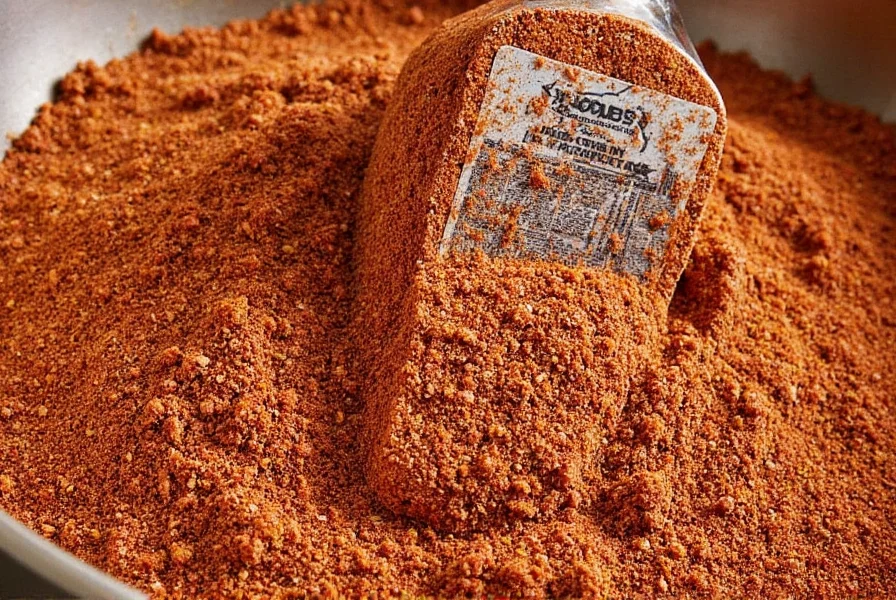
So next time you fire up the smoker or hit the grill, grab your favorite Memphis rub and let those flavors do the talking. Because once you go dry-rubbed, there's no going back.

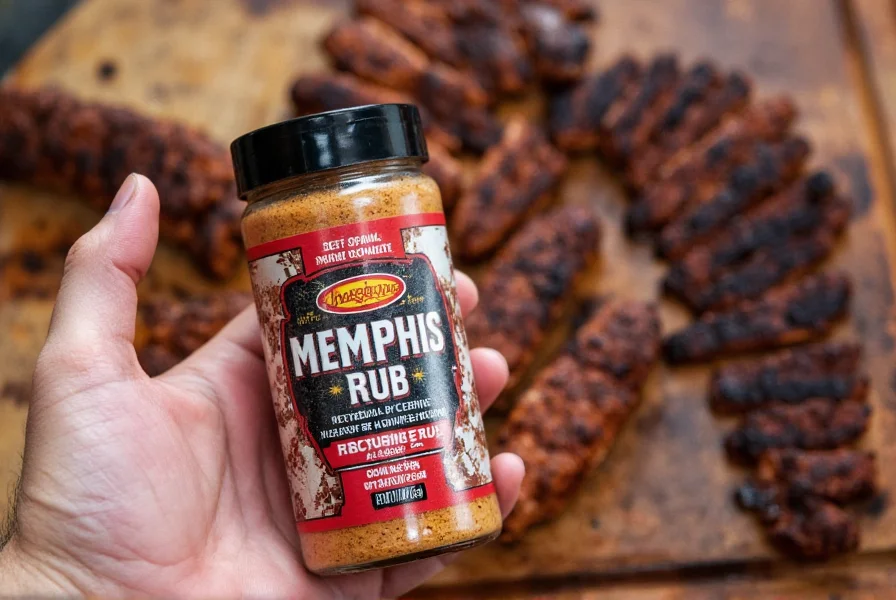









 浙公网安备
33010002000092号
浙公网安备
33010002000092号 浙B2-20120091-4
浙B2-20120091-4